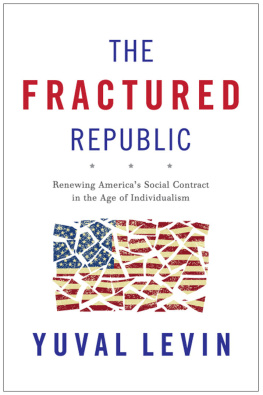INTRODUCTION
This book is a how to guide for addressing some of Americas most pressing public-policy challenges. Though such challenges are never in short supply, todays profusion of them is exceptional making the need for clear thinking about them exceptionally urgent.
America finds herself in the midst of a governing crisis. It has been years in the making caused by the crumbling of large governing institutions and public programs established in the middle of the last century, as well as by the transformation of the global economic order. The great task of American public life in the coming years will be to understand these shifts and the problems they have created, and to craft policy solutions capable of addressing them.
This collection aims to help in that task. Its first two chapters articulate the nature of the problem we face, and the subsequent 16 chapters offer specific policy reforms of the welfare state, of the tax code, of our financial and monetary systems, of education, and of state budgets and policies.
Because they were written by 19 different authors, these essays do not agree on every point; indeed, several offer proposals that are in tension with others. But all are guided by a common vision of American life: by confidence and pride in our country, by a sense that our challenge is to build on our strengths to address our weaknesses, and by the conviction that chief among those strengths are our democratic capitalism, our ideals of liberty and equality under the law, and our roots in the longstanding traditions of the West. All of these essays also reflect the concern that American government has taken on too many tasks to perform any of them effectively. Thus each chapter offers proposals that would lead to a smaller but more capable government, and to a larger and more assertive private sector.
This vision of America and this approach to addressing its foremost problems define the work of National Affairs, a quarterly journal launched in 2009 to help Americans think more clearly about the challenges of self-government. Each quarter, National Affairs publishes essays about public policy, society, culture, politics, and the world of ideas, with an eye to what thoughtful Americans ought to know, and with a special concern for domestic policy and political economy, broadly understood.
The chapters of this book have all been previously published as essays in the journals pages. As it is all too easy, especially in times of change and challenge, to reflect on broad abstractions while ignoring the details of specific policy problems, this collection includes some of the most manifestly policy-minded articles of those we have published to date. It is a compilation of achievable policy solutions. To speak of policy solutions is not to imply that we think that policy or politics can finally solve any true social problem only that some of our problems are exacerbated by poor public policy, and could be meaningfully mitigated by thoughtful reforms.
This emphasis on achievable solutions reflects an appreciation of the how of government of the ways in which the means of government can shape public life just as much as its ends. Indeed, those of us who are most inclined to think seriously about the proper ends of government are too often prone to lose sight of the importance of means. This tendency is nothing new: A good government implies two things, James Madison wrote in Federalist No. 62. First, fidelity to the object of government, which is the happiness of the people; secondly, a knowledge of the means by which that object can be best attained. Some governments are deficient in both these qualities; most governments are deficient in the first. I scruple not to assert, that in American governments too little attention has been paid to the last.
Not much has changed on that front, but the dilemmas of this moment demand that attention be paid to the means of American government, almost as much as to its ends. We hope that this volume contributes in some modest measure to clear thinking about both, at a time when such thinking is in critical demand.
The Editors
I. AMERICAS CHALLENGE
Beyond the Welfare State
Yuval Levin
SPRING 2011
IT IS BECOMING INCREASINGLY CLEAR that we in America are living through a period of transition. One chapter of our national life is closing, and another is about to begin. We can sense this in the tense volatility of our electoral politics, as dramatic change elections follow closely upon one another. We can feel it in the unseemly mood of decline that has infected our public life leaving our usually cheerful nation fretful about global competition and unsure if the next generation will be able to live as well as the present one. Perhaps above all, we can discern it in an overwhelming sense of exhaustion emanating from many of our public institutions our creaking mid-century transportation infrastructure, our overburdened regulatory agencies struggling to keep pace with a dynamic economy, our massive entitlement system edging toward insolvency.
But these are mostly symptoms of our mounting unease. The most significant cause runs deeper. We have the feeling that profound and unsettling change is afoot because the vision that has dominated our political imagination for a century the vision of the social-democratic welfare state is drained and growing bankrupt, and it is not yet clear just what will take its place.
That vision was an answer to a question America must still confront: How shall we balance the competing aspirations of our society aspirations to both wealth and virtue, dynamism and compassion? How can we fulfill our simultaneous desires to race ahead yet leave no one behind? The answer offered by the social-democratic ideal was a technocratic welfare state that would balance these aspirations through all-encompassing programs of social insurance. We would retain a private economy, but it would be carefully managed in order to curb its ill effects, and a large portion of its output would be used by the government to address large social problems, lessen inequality, and thus also build greater social solidarity.
YUVAL LEVIN is the editor of National Affairs, and a fellow at the Ethics and Public Policy Center.
Of course, this vision has never been implemented in full. But it has offered a model, for good and for ill. For the left, it provided long-term goals, criteria for distinguishing progress from retreat in making short-term compromises, and a kind of definition of the just society. For the right, it was a foil to be combated and averted an archetype of soulless, stifling bureaucratic hubris and it helped put objections to seemingly modest individual leftward steps into a broader, more coherent context. But both ends of our politics seemed implicitly to agree that, left to its own momentum, this is where our country was headed where history would take us if no one stood athwart it yelling stop.
It is no longer really possible to think so. All over the developed world, nations are coming to terms with the fact that the social-democratic welfare state is turning out to be untenable. The reason is partly institutional: The administrative state is dismally inefficient and unresponsive, and therefore ill-suited to our age of endless choice and variety. The reason is also partly cultural and moral: The attempt to rescue the citizen from the burdens of responsibility has undermined the family, self-reliance, and self-government. But, in practice, it is above all fiscal: The welfare state has turned out to be unaffordable, dependent as it is upon dubious economics and the demographic model of a bygone era. Sustaining existing programs of social insurance, let alone continuing to build new ones on the social-democratic model, has become increasingly difficult in recent years, and projections for the coming decades paint an impossibly grim and baleful picture. There is simply no way that Europe, Japan, or America can actually go where the economists long-term charts now point to debts that utterly overwhelm their productive capacities, governments that do almost nothing but support the elderly, and economies with no room for dynamism, for growth, or for youth. Some change must come, and so it will.














